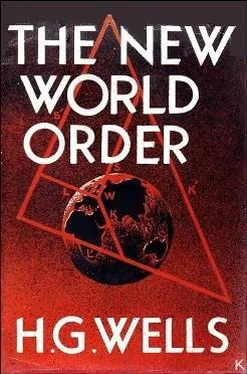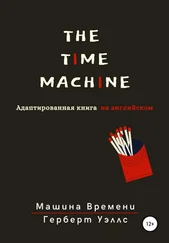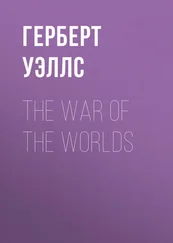Герберт Уэллс - The New World Order
Здесь есть возможность читать онлайн «Герберт Уэллс - The New World Order» весь текст электронной книги совершенно бесплатно (целиком полную версию без сокращений). В некоторых случаях можно слушать аудио, скачать через торрент в формате fb2 и присутствует краткое содержание. Год выпуска: 1940, Жанр: Политика, Публицистика, на английском языке. Описание произведения, (предисловие) а так же отзывы посетителей доступны на портале библиотеки ЛибКат.
- Название:The New World Order
- Автор:
- Жанр:
- Год:1940
- ISBN:нет данных
- Рейтинг книги:4 / 5. Голосов: 1
-
Избранное:Добавить в избранное
- Отзывы:
-
Ваша оценка:
- 80
- 1
- 2
- 3
- 4
- 5
The New World Order: краткое содержание, описание и аннотация
Предлагаем к чтению аннотацию, описание, краткое содержание или предисловие (зависит от того, что написал сам автор книги «The New World Order»). Если вы не нашли необходимую информацию о книге — напишите в комментариях, мы постараемся отыскать её.
The New World Order — читать онлайн бесплатно полную книгу (весь текст) целиком
Ниже представлен текст книги, разбитый по страницам. Система сохранения места последней прочитанной страницы, позволяет с удобством читать онлайн бесплатно книгу «The New World Order», без необходимости каждый раз заново искать на чём Вы остановились. Поставьте закладку, и сможете в любой момент перейти на страницу, на которой закончили чтение.
Интервал:
Закладка:
This war storm which is breaking upon us now, due to the continued fragmentation of human government among a patchwork of sovereign states, is only one aspect of the general need for a rational consolidation of human affairs. The independent sovereign state with its perpetual war threat, armed with the resources of modern mechanical frightfulness, is only the most blatant and terrifying aspect of that same want of a coherent general control that makes overgrown, independent, sovereign, private business organisations and combinations, socially destructive. We should still be at the mercy of the "Napoleons" of commerce and the "Attilas" of finance, if there was not a gun or a battleship or a tank or a military uniform in the world. We should still be sold up and dispossessed.
Political federation, we have to realise, without a concurrent economic collectivisation, is bound to fail. The task of the peace-maker who really desires peace in a new world, involves not merely a political but a profound social revolution, profounder even than the revolution attempted by the Communists in Russia. The Russian Revolution failed not by its extremism but through the impatience, violence and intolerance of its onset, through lack of foresight and intellectual insufficiency. The cosmopolitan revolution to a world collectivism, which is the only alternative to chaos and degeneration before mankind, has to go much further than the Russian; it has to be more thorough and better conceived and its achievement demands a much more heroic and more steadfast thrust.
It serves no useful purpose to shut our eyes to the magnitude and intricacy of the task of making the world peace. These are the basic factors of the case.
4. CLASS-WAR
Now here it is necessary to make a distinction which is far too frequently ignored. Collectivisation means the handling of the common affairs of mankind by a common control responsible to the whole community. It means the suppression of go-as-you-please in social and economic affairs just as much as in international affairs. It means the frank abolition of profit-seeking and of every device by which human beings contrive to be parasitic on their fellow men. It is the practical realisation of the brotherhood of man through a common control. It means all that and it means no more than that.
The necessary nature of that control, the way to attain it and to maintain it have still to be discussed.
The early forms of socialism were attempts to think out and try out collectivist systems. But with the advent of Marxism, the larger idea of collectivism became entangled with a smaller one, the perpetual conflict of people in any unregulated social system to get the better of one another. Throughout the ages this has been going on. The rich, the powerful generally, the more intelligent and acquisitive have got away with things, and sweated, oppressed, enslaved, bought and frustrated the less intelligent, the less acquisitive and the unwary. The Haves in every generation have always got the better of the Have-nots, and the Have-nots have always resented the privations of their disadvantage.
So it is and so in the uncollectivised world it has always been. The bitter cry of the expropriated man echoes down the ages from ancient Egypt and the Hebrew prophets, denouncing those who grind the faces of the poor. At times the Have-nots have been so uneducated, so helplessly distributed among their more successful fellows that they have been incapable of social disturbance, but whenever such developments as plantation or factory labour, the accumulation of men in seaport towns, the disbanding of armies, famine and so forth, brought together masses of men at the same disadvantage, their individual resentments flowed together and became a common resentment. The miseries underlying human society were revealed. The Haves found themselves assailed by resentful, vindictive revolt.
Let us note that these revolts of the Have-nots throughout the ages have sometimes been very destructive, but that invariably they have failed to make any fundamental change in this old, old story of getting and not getting the upper hand. Sometimes the Have-nots have frightened or otherwise moved the Haves to more decent behaviour. Often the Have-nots have found a Champion who has ridden to power on their wrongs. Then the ricks were burnt or the ch�teaux. The aristocrats were guillotined and their heads carried on exemplary pikes. Such storms passed and when they passed, there for all practical purposes was the old order returning again; new people but the old inequalities. Returning inevitably, with only slight variations in appearance and phraseology, under the condition of a non-collective social order.
The point to note is that in the unplanned scramble of human life through the centuries of the horse-and-foot period, these incessantly recurring outbreaks of the losers against the winners have never once produced any permanent amelioration of the common lot, or greatly changed the features of the human community. Not once.
The Have-nots have never produced the intelligence and the ability and the Haves have never produced the conscience, to make a permanent alteration of the rules of the game. Slave revolts, peasant revolts, revolts of the proletariat have always been fits of rage, acute social fevers which have passed. The fact remains that history produces no reason for supposing that the Have-nots, considered as a whole, have available any reserves of directive and administrative capacity and disinterested devotion, superior to that of the more successful classes. Morally, intellectually, there is no reason to suppose them better.
Many potentially able people may miss education and opportunity; they may not be inherently inferior but nevertheless they are crippled and incapacitated and kept down. They are spoilt. Many specially gifted people may fail to "make good" in a jostling, competitive, acquisitive world and so fall into poverty and into the baffled, limited ways of living of the commonalty, but they too are exceptions. The idea of a right-minded Proletariat ready to take things over is a dream.
As the collectivist idea has developed out of the original propositions of socialism, the more lucid thinkers have put this age-long bitterness of the Haves and Have-nots into its proper place as part, as the most distressing part, but still only as part, of the vast wastage of human resources that their disorderly exploitation entailed. In the light of current events they have come to realise more and more clearly that the need and possibility of arresting this waste by a world-wide collectivisation is becoming continually more possible and at the same time imperative. They have had no delusions about the education and liberation that is necessary to gain that end. They have been moved less by moral impulses and sentimental pity and so forth, admirable but futile motives, as by the intense intellectual irritation of living in a foolish and destructive system. They are revolutionaries not because the present way of living is a hard and tyrannous way of living, but because it is from top to bottom exasperatingly stupid.
But thrusting athwart the socialist movement towards collectivisation and its research for some competent directive organisation of the world's affairs, came the clumsy initiative of Marxism with its class-war dogma, which has done more to misdirect and sterilise human good will than any other misconception of reality that has ever stultified human effort.
Marx saw the world from a study and through the hazes of a vast ambition. He swam in the current ideologies of his time and so he shared the prevalent socialist drive towards collectivisation. But while his sounder-minded contemporaries were studying means and ends he jumped from a very imperfect understanding of the Trades Union movement in Britain to the wildest generalisations about the social process. He invented and antagonised two phantoms. One was the Capitalist System; the other the Worker.
Читать дальшеИнтервал:
Закладка:
Похожие книги на «The New World Order»
Представляем Вашему вниманию похожие книги на «The New World Order» списком для выбора. Мы отобрали схожую по названию и смыслу литературу в надежде предоставить читателям больше вариантов отыскать новые, интересные, ещё непрочитанные произведения.
Обсуждение, отзывы о книге «The New World Order» и просто собственные мнения читателей. Оставьте ваши комментарии, напишите, что Вы думаете о произведении, его смысле или главных героях. Укажите что конкретно понравилось, а что нет, и почему Вы так считаете.

![Герберт Уэллс - The War of the Worlds [С англо-русским словарем]](/books/26611/gerbert-uells-the-war-of-the-worlds-s-anglo-thumb.webp)










